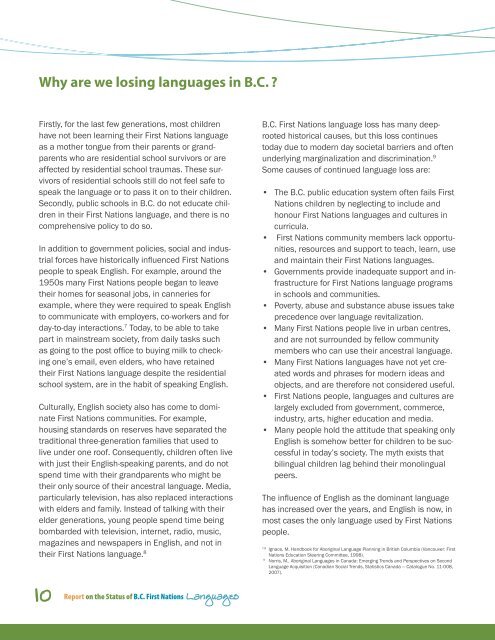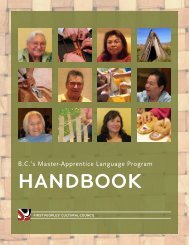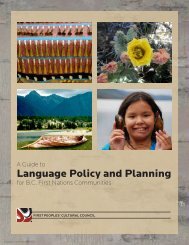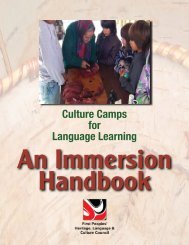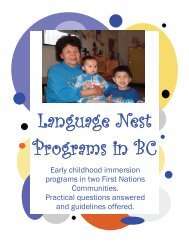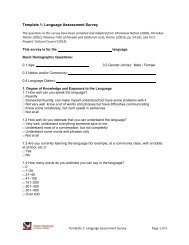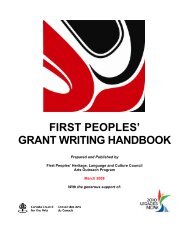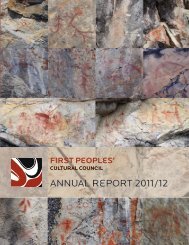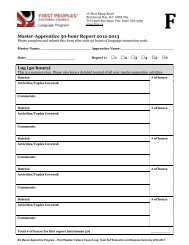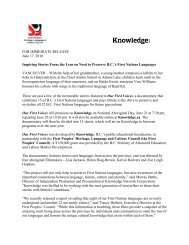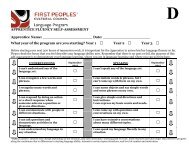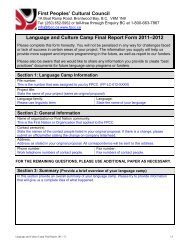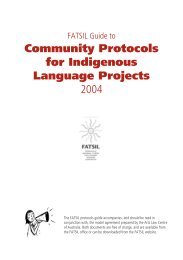What is the status of BC First nations languages? - First Peoples
What is the status of BC First nations languages? - First Peoples
What is the status of BC First nations languages? - First Peoples
Create successful ePaper yourself
Turn your PDF publications into a flip-book with our unique Google optimized e-Paper software.
Why are we losing <strong>languages</strong> in B.C. ?<strong>First</strong>ly, for <strong>the</strong> last few generations, most childrenhave not been learning <strong>the</strong>ir <strong>First</strong> Nations languageas a mo<strong>the</strong>r tongue from <strong>the</strong>ir parents or grandparentswho are residential school survivors or areaffected by residential school traumas. These survivors<strong>of</strong> residential schools still do not feel safe tospeak <strong>the</strong> language or to pass it on to <strong>the</strong>ir children.Secondly, public schools in B.C. do not educate childrenin <strong>the</strong>ir <strong>First</strong> Nations language, and <strong>the</strong>re <strong>is</strong> nocomprehensive policy to do so.In addition to government policies, social and industrialforces have h<strong>is</strong>torically influenced <strong>First</strong> Nationspeople to speak Engl<strong>is</strong>h. For example, around <strong>the</strong>1950s many <strong>First</strong> Nations people began to leave<strong>the</strong>ir homes for seasonal jobs, in canneries forexample, where <strong>the</strong>y were required to speak Engl<strong>is</strong>hto communicate with employers, co-workers and forday-to-day interactions. 7 Today, to be able to takepart in mainstream society, from daily tasks suchas going to <strong>the</strong> post <strong>of</strong>fice to buying milk to checkingone’s email, even elders, who have retained<strong>the</strong>ir <strong>First</strong> Nations language despite <strong>the</strong> residentialschool system, are in <strong>the</strong> habit <strong>of</strong> speaking Engl<strong>is</strong>h.Culturally, Engl<strong>is</strong>h society also has come to dominate<strong>First</strong> Nations communities. For example,housing standards on reserves have separated <strong>the</strong>traditional three-generation families that used tolive under one ro<strong>of</strong>. Consequently, children <strong>of</strong>ten livewith just <strong>the</strong>ir Engl<strong>is</strong>h-speaking parents, and do notspend time with <strong>the</strong>ir grandparents who might be<strong>the</strong>ir only source <strong>of</strong> <strong>the</strong>ir ancestral language. Media,particularly telev<strong>is</strong>ion, has also replaced interactionswith elders and family. Instead <strong>of</strong> talking with <strong>the</strong>irelder generations, young people spend time beingbombarded with telev<strong>is</strong>ion, internet, radio, music,magazines and newspapers in Engl<strong>is</strong>h, and not in<strong>the</strong>ir <strong>First</strong> Nations language. 8B.C. <strong>First</strong> Nations language loss has many deeprootedh<strong>is</strong>torical causes, but th<strong>is</strong> loss continuestoday due to modern day societal barriers and <strong>of</strong>tenunderlying marginalization and d<strong>is</strong>crimination. 9Some causes <strong>of</strong> continued language loss are:• The B.C. public education system <strong>of</strong>ten fails <strong>First</strong>Nations children by neglecting to include andhonour <strong>First</strong> Nations <strong>languages</strong> and cultures incurricula.• <strong>First</strong> Nations community members lack opportunities,resources and support to teach, learn, useand maintain <strong>the</strong>ir <strong>First</strong> Nations <strong>languages</strong>.• Governments provide inadequate support and infrastructurefor <strong>First</strong> Nations language programsin schools and communities.• Poverty, abuse and substance abuse <strong>is</strong>sues takeprecedence over language revitalization.• Many <strong>First</strong> Nations people live in urban centres,and are not surrounded by fellow communitymembers who can use <strong>the</strong>ir ancestral language.• Many <strong>First</strong> Nations <strong>languages</strong> have not yet createdwords and phrases for modern ideas andobjects, and are <strong>the</strong>refore not considered useful.• <strong>First</strong> Nations people, <strong>languages</strong> and cultures arelargely excluded from government, commerce,industry, arts, higher education and media.• Many people hold <strong>the</strong> attitude that speaking onlyEngl<strong>is</strong>h <strong>is</strong> somehow better for children to be successfulin today’s society. The myth ex<strong>is</strong>ts thatbilingual children lag behind <strong>the</strong>ir monolingualpeers.The influence <strong>of</strong> Engl<strong>is</strong>h as <strong>the</strong> dominant languagehas increased over <strong>the</strong> years, and Engl<strong>is</strong>h <strong>is</strong> now, inmost cases <strong>the</strong> only language used by <strong>First</strong> Nationspeople.7,8Ignace, M. Handbook for Aboriginal Language Planning in Brit<strong>is</strong>h Columbia (Vancouver: <strong>First</strong>Nations Education Steering Committee, 1998).9Norr<strong>is</strong>, M., Aboriginal Languages in Canada: Emerging Trends and Perspectives on SecondLanguage Acqu<strong>is</strong>ition (Canadian Social Trends, Stat<strong>is</strong>tics Canada — Catalogue No. 11-008,2007).10Report on <strong>the</strong> Status <strong>of</strong> B.C. <strong>First</strong> Nations Languages


